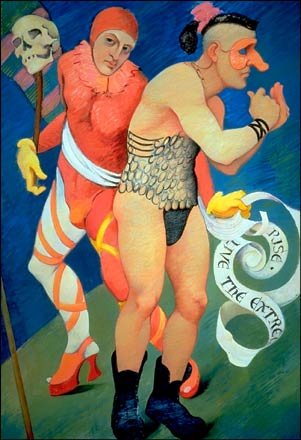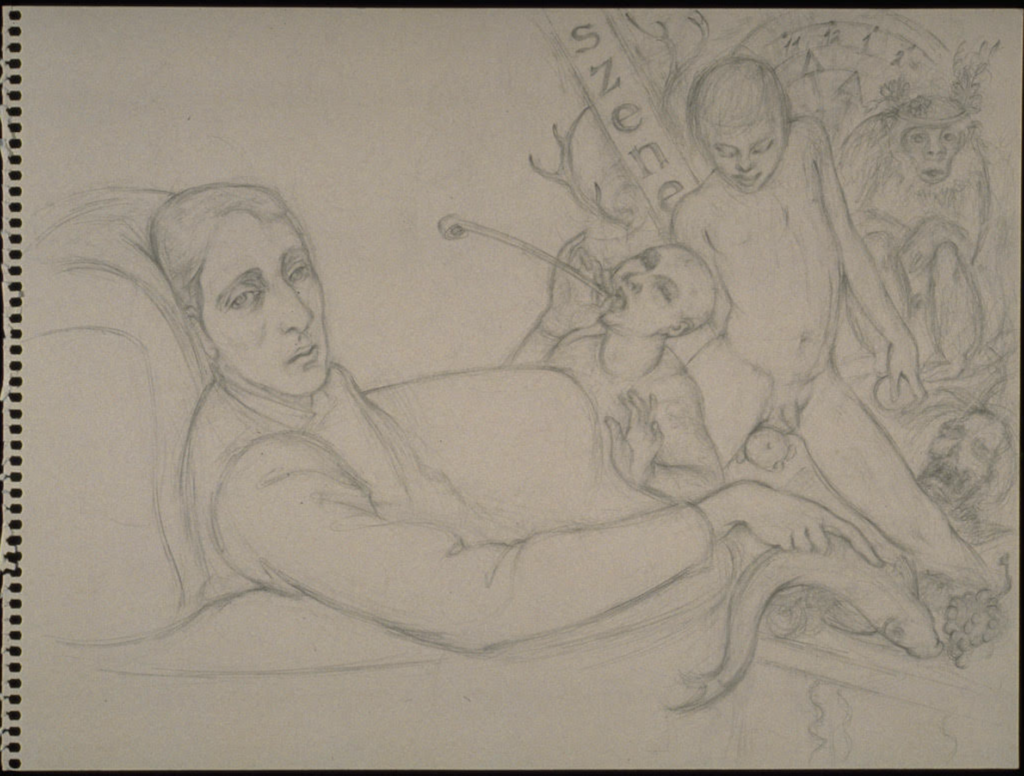While the holy month of Pride was upon us, I thought often of the ancient Dance of Death. Through the 1990s, at the height of the AIDS epidemic, a parade saluting sexual behaviors that shortened lives struck me as a celebration against itself—an inverted Danse Macabre. What once had been cautionary and didactic was becoming exhortative. The parade was encouraging if not, in a perverse way, edifying. A certain kind of free spiritedness, however lethal, was assumed to be tinged with heroism. Grab some poppers, rise up and live the extreme.

The brother of a close friend did just that. He died of AIDS in 2002. The twenty-second anniversary of his death comes this July.
Let me call him Alvaro. Educated by Jesuits in Cuba before emigrating to the U.S., he taught at Fordham Prep for some two decades. He attended Mass regularly at St. Francis Xavier on West 16th Street, ground zero of Fr. James Martin’s ministry to LBGTQ Catholics.
Alvaro was a sweet man, a lively conversationalist, and a passionate defender of Pope John Paul II. The only time I ever saw him angry was at any slight directed toward John Paul or the Church. And yet . . . .
He did not welcome the promiscuity that drove him; neither could he free himself from it. Several times at one of many dinners at his sister’s apartment, he said “I didn’t want to be this way.” [When I read dismissive references to so-called “conversion therapy” as if it were something sinister or markedly different from ordinary therapy, I remember Alvaro.]
Technically, he died of Lymphoma. But at the time, it could not be treated adequately because his immune system was too severely compromised by AIDS. During the months Alvaro was surviving on an anti-HIV combo of medicines, he would grin and say cheerfully: “As long as I have my cocktail, I’m happy.”
A Jesuit from Fordham Prep came to his wake. He prayed over the coffin and spoke a few words to those of us who were there. One thing that he said has stayed with me over the years since. I could not forget it. Familiar with Alvaro’s life and practices, this priest declared: “Jesus only told us to love. He did not tell us who to love.”
That startled me. I never knew what to say. Not even to myself. Where was the love in Alvaro’s long string of obsessive affairs—if they can even be called affairs? He lived separately from the man who loved him, and was considered his partner. That privacy left him free to have sex when, and with whomever, it was available.
Coming just after Pride month, the priest’s exculpatory comment was meant to console the largely gay gathering. In deference to his hearers, Father excused the dead man from the behaviors that had cost him his life. His words were misleading, even duplicitous. Torah-true and devout, Jesus did not have to tell his fellow Jews whom to love. Or not. They already knew.
The Open Secret of Gay Marriages
Pride month reminds me, too, of Prop 8 (though for reasons not mentioned here).
In 2010, California’s 2008 ban on same-sex marriage, a ballot initiative, was being contested in federal court. Shortly before Proposition 8 was overturned, the New York Times ran a smiling piece on the benefits—even the superiority—of same-sex marriage.
As the trial phase . . . . concludes in federal court, gay nuptials are portrayed by opponents as an effort to rewrite the traditional rules of matrimony. Quietly, outside of the news media and courtroom spotlight, many gay couples are doing just that, according to groundbreaking new research.
A study to be released next month is offering a rare glimpse inside gay relationships and reveals that monogamy is not a central feature for many. Some gay men and lesbians argue that, as a result, they have stronger, longer-lasting and more honest relationships. And while that may sound counterintuitive, some experts say boundary-challenging gay relationships represent an evolution in marriage ? one that might point the way for the survival of the institution.
In sum, marriage will be revived by jettisoning old habits of fidelity and monogamy. That dreary business about “until-death-do-us-part” is a drag as life-expectancy increases. So long as extra-curricular sex is accomplished with the knowledge and approval of one’s steady partner, there is no need to sneak around. Colleen Hoff, principal investigator of San Francisco State University’s Gay Couples Study, states handsomely that “With straight people, it’s called affairs or cheating. But with gay people it does not have such negative connotations.”
On the contrary, transparency can make relationships even stronger, last longer! So asserts the NYT. But the article is mum on how this evolution of marriage might be juggled by couples with children. And there is no hint of interest or concern for its effect on kids of any age.
• • • • •
After Alvaro’s burial, I went home took out an old unused drawing pad that had belonged to my father and drew. The paper was faded; the image appears darker on screen than in reality. But the liniments of a memento mori are there. The theme was clearer to me on paper than it was in words at the time.



